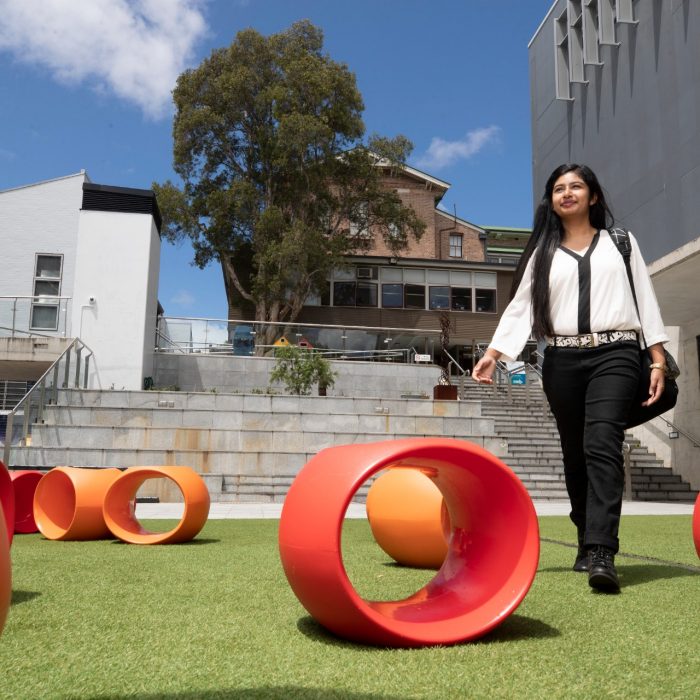- Home
- About us
- Study areas
- Student life & resources
- Research
- Partner with us
-
Impact & excellence
-
Our impact
- Shisha No Thanks! Preventing the harms of water pipe use
- Ending COVID lockdown by targeting transmission with vaccination
- Improving the lives of young people with complex needs
- Co-designing Australia’s first trauma recovery centre
- Supporting COVID-19 communication and engagement with people from Culturally and Linguistically Diverse Communities
- Understanding supervision lapses in child drowning
- Link between prison cell size and infectious disease transmission informs law change
-
Our impact
- Home
- About us
- Study areas
- Student life & resources
- Research
- Partner with us
-
Impact & excellence
Our impact
- Shisha No Thanks! Preventing the harms of water pipe use
- Ending COVID lockdown by targeting transmission with vaccination
- Improving the lives of young people with complex needs
- Co-designing Australia’s first trauma recovery centre
- Supporting COVID-19 communication and engagement with people from Culturally and Linguistically Diverse Communities
- Understanding supervision lapses in child drowning
- Link between prison cell size and infectious disease transmission informs law change
Undergraduate

Undergraduate coursework: Bachelor of Public Health (BPH 3881)
The UNSW Bachelor of Public Health (BPH) (3881) is an innovative three-year degree, which explores diverse areas including health promotion, epidemiology, communicable diseases, policy and research methods, Aboriginal health, health surveillance, and global chronic diseases.
The degree is available in dual mode delivery. There is the option to study fully online or to come to the UNSW Sydney campus to complete some of the courses. You can undertake the degree on a full or part-time basis, at a pace that suits your needs and can commence your studies at multiple entry points across the year. The degree is offered to domestic students and to people studying in Australia on student visas (CRICOS Course Code 116678A).
In your first year, you will study courses that will develop your understanding of core public health topics including global health, health promotion, Indigenous health, and human biology. During your second year, you will continue to build your understanding and develop your skills with a focus on epidemiology, policy development and advocacy, surveillance, and data analysis, as well as leadership in public health. You will also have the opportunity to bring together learning developed during your program and to apply and further develop public health knowledge and skills through a research project, internship, or public health study tour.
You can read more about how to enrol, key dates, credit transfer and more with the information and links provided on this page.
-
The Bachelor of Public Health is designed for students who are interested in improving health outcomes and tackling health challenges among populations across the world.
-
Credit transfer (otherwise known as ‘recognised prior learning’ or RPL) acknowledges previous learning at another tertiary institution or in another UNSW degree, completed successfully within the previous 10 years. Credit transfer may be granted as advanced standing. Advanced standing expedites your progression through your program by reducing the units of credit (UOC) you need to complete. Advanced standing will be recorded on your UNSW transcript as either:
specified credit mapped to a specific BPH compulsory (core) course; or
unspecified credit towards the BPH elective requirements.
Please refer to the UNSW Credit Transfer, opens in a new window website for further information.
Students requesting RPL for undergraduate Bachelor programs, must ‘complete a program of study no less than that required of students in full-time attendance in the final year of the program concerned.’ Based on this, students can potentially apply for up to 96 UOC RPL towards the BPH.
-
For advanced standing towards a core course in the BPH, the course must have comparable learning outcomes to the course for which direct credit will be given and have equivalent Units of Credit. Advanced standing for electives will be considered on a case-by-case basis by the Program and may be given as unspecified credit. Previously completed courses not relevant to public health may be granted advanced standing for General Education (GE) courses. GE is intended to broaden knowledge and skills outside the discipline of the main program. The Program Authority will assess whether GE requirements are met when reviewing the RPL application.
-
To receive advanced standing for previously completed courses, the course must be at least a Level 7 on the Australian Qualifications Framework, opens in a new window. Level 1-6 courses and programs are ineligible to receive advanced standing in the BPH program. These include Certificates, Diplomas, Advanced Diplomas and Associate Degrees. Level 7 or higher courses successfully completed at TAFE or other institutions may be eligible to receive advanced standing.
Students who have completed pathway programs (including Diplomas) may include these programs as part of their application for entry into a UNSW program, including the BPH. However, courses completed in pathway programs cannot be used in applications for credit transfer for individual subjects in the BPH. Examples of entry pathway programs include (but not limited to): UNSW Prep programs; Insearch UTS; SIBT and UoN Open Foundation, University of Newcastle.
Life experience, mature age entry, and/or work experience are not grounds for credit transfer.
All applications for credit transfer will be assessed by the Program Authority.
-
Applications for Credit need to be submitted online. See UNSW Web Forms, opens in a new window.
Attach a detailed Course Outline which includes the course description, course aims, contact hours, units of credit and assessment details.
Include an Academic Transcript which confirms the final result for the course and the grade definitions information.
Any credit granted must be consistent with requirements for progression in the relevant program at UNSW and must be approved by the Program Authority.
-
- BPH students can find information about UNSW term dates, census dates, enrolment/drop course dates etc on the current student key dates page.
-
View Summer 2025 timetable, opens in a new window - Undergraduate
View Term 1 2025 timetable, opens in a new window - Undergraduate
View Term 2 2025 timetable, opens in a new window - Undergraduate
View Term 3 2025 timetable, opens in a new window - Undergraduate
-
View Term 3 2024 timetable, opens in a new window - Undergraduate
-
- BPH students can find information about the study plan on the Current Students Progression Plans Page., opens in a new window
FAQs
-
A normal full-time load is three courses per term (18 units of credit). Internal students who are also working full-time are advised to take no more than two courses. Domestic students wishing to be considered full-time need to enrol in a minimum of 12 Units of Credit (UoC) each term, or 36 UoC across three standard terms with at least one course enrolment in each term. If you are an International student studying on a student visa you must satisfy certain conditions such as completing studies within the time frames set out in your Confirmation of Enrolment (CoE). For further information see UNSW Academic Calendar, opens in a new window.
-
UNSW has provided a wealth of useful resources to help support students’ online learning. Please refer to the below websites for further information and support:
- UNSW e-learning, opens in a new window - provides an overview of the suite of technologies and applications that support student learning including Moodle, Turnitin, and myLibrary.
- UNSW Online Study, opens in a new window – provides for useful tips to online study.
- Academic skills, opens in a new window – provides an overview on academic skills.
- UNSW Essentials, opens in a new window – provides an online orientation to UNSW.
- ELISE, opens in a new window – is an online tutorial developed by UNSW Library to help students make the most of the Library’s online resources for their studies and research.
An orientation module to the BIPH and BPH programs will cover these aspects in greater detail to help students succeed in navigating the online learning management systems.
-
Please contact the Nucleus Student Hub for any questions about the BIPH or BPH.
T: 02 9385 8500



